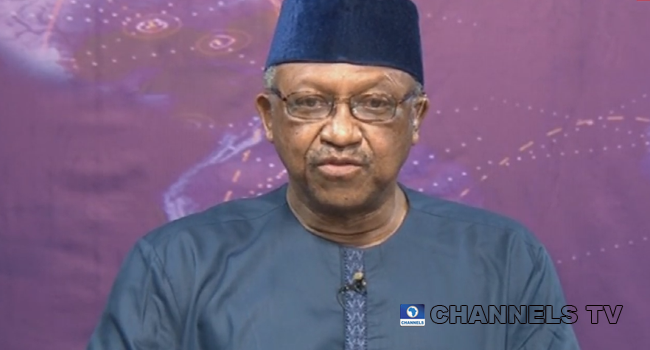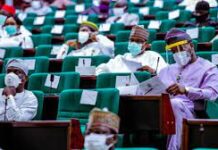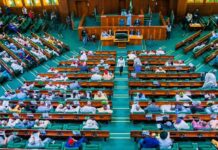By AKOR SYLVESTER-Abuja
The minister of Health, Osagie Ehanire yesterday expressed dissatisfaction over the slow space of COVID-19 vaccination in the country, saying the country needs to run in COVID-19 vaccine uptake in order to meet the target of 70% herd immunity achievement.
He also said that taking the COVID-19 vaccine is not just an act of self-protection but also a civic duty to curtail the spread of the virus.
The minister who spoke at the Flag Off of SCALES 3.0 Strategy for COVID-19 Vaccination in Abuja Monday said though Nigeria has made progress in curtailing the spread of COVID-19 virus, the level of the vaccine intake in the country is bellow expectation.
He said every one has a critical role to play in the effort to stop the virus from spreading, while urging those who are yet to be vaccinated to get vaccinated.
The minister said Nigerians must continue to observe the COVID-19 prevention and control protocols such as regular hand washing, wearing of face mask, maintenance of physical distance and avoiding large gatherings.
According to him, “With diligent observance of the protocols and sustained efforts at mass vaccination, we will surely conquer the pandemic in record time. All it takes is your usual unalloyed commitment”
He said the SCALES 3.0 Strategy is aimed at accelerating the integrated COVID-19 vaccination scheme with routine immunisation, maintaining that it marks a major step in the country’s collective resolve to wipe out the COVID-19 virus and at the same time scale up routine immunization from Nigeria.
He said: “As you might be aware, the Federal Government has through the National Primary Health Care Development Agency (NPHCDA) deployed several strategies including the optimized SCALES 2.0 strategy to ramp up integrated COVID-19 vaccination and Primary Health Care services across the country. Consequently, our vaccination effort has scaled up significantly.
“However, the total performance still leaves much to be desired. As of 3rd August 2022, only 24.4 percent of the total eligible population have been fully vaccinated. Only 3 states (Nasarawa, Jigawa and Kano) have vaccination coverage of over 50 percent, leaving 34 states performing sub-optimally in terms of COVID-19 vaccination coverage. Hence, the need for the team to refine the current SCALES 2.0 strategy to accelerate COVID-19 vaccination, identifying unique enablers per state and deploy state-specific strategies.
“Termed SCALES 3.0, the strategy will be anchored on an intensive 3 months campaign, performance-based incentives, optimized integrated package of services, decentralized and incentivized demand generation strategies, partners coordination and accountability, and state-specific context and strategies. Based on these principles, the strategy is poised to curb the spread of the COVID-19 virus and gain the desired herd immunity as quickly as possible.
“While we are glad that Nigeria is ranked among the high-performing countries in terms of COVID-19 vaccine rollout in Africa, we can’t but acknowledge the fact that we still have a lot of work to do as the statistics quoted above has shown.
We recognize the fact that the campaign can only succeed if there is mass mobilization of the people. We are therefore calling on state governors, local government chairmen, traditional and religious leaders, the media, and every Nigerian to lend their support in mobilizing the unvaccinated eligible individuals to register and get vaccinated or walk into the nearest vaccination centres and get vaccinated.
“Let me assure all Nigerians that the Federal Government remains committed to the provision of safe and efficacious COVID-19 vaccines in the country backed with accountability and transparency. Every COVID-19 vaccine in Nigeria is tagged and tracked by National Agency for Food and Drug Administration and Control (NAFDAC) to ensure quality and potency are maintained across the supply chain.
“We are fully guided by the principle of safety, efficacy, transparency, and accountability in the mass vaccination campaign. No vaccine will be allowed to enter any vaccination site without due authentication and safety verification. We will never compromise on vaccine safety and vaccination standards”.
The minister expressed appreciation to the countries who have magnanimously contributed to the fight against COVID-19 by donating vaccines and lending technical and other forms of support.
Speaking, the Secretary to the Government of the Federation, Boss Mustapha attributed the slow space of vaccine intake in the country to vaccine hesitancy amongst Nigerians.
He said “Nigeria has continued to experience changes in the factors that influence demand and uptake of COVID-19 vaccines. These changing situations are not uniform across the country. They vary from state to state, and therefore require continuous review of our strategies for promoting demand and ensuring vaccine access and accountability.
“Earlier in February 2022, we launched optimized SCALES 2.0 strategy, which though has proven to be effective in ramping up COVID 19 vaccination coverage, the proportion of fully vaccinated Nigerians is still low when compared to the set target.
“The present record of only 24.4% of the total eligible population of fully vaccinated as at August 3 2022 leaves much to be desired.
The SCALES 3.0 strategy will address the identified implementation gaps in SCALES 2.0 and bring about more accountability for performance, strengthen electronic data reporting and promote robust demand generation at the community levels.
“Esteemed Ladies and Gentlemen, it is safe to state that there is significant decline in the deaths due to COVID-19 as a result of the ongoing vaccination, We should not lower our guard or give in to complacency as the virus is still very much around and can mutate.
“We must encourage all around us to get vaccinated. Let us also, not relent on observing the non-pharmaceutical measures – wear the mask, keep physical distance and wash our hands regularly.
“Until we have vaccinated at least 70% of eligible Nigerians to achieve herd immunity, no one is safe”, he noted.
Earlier in his address, the Executive Director of the National Primary Health Care Development Agency (NPHCDA) Faisal Shuaib recalled that the country, in 6 months ago, flagged off the optimized SCALES 2.0 strategy to ramp-up integrated COVID-19 vaccination and PHC services.
According to him, “with this strategy, our national vaccination coverage progressed from about 17 million to 40 million as at 8th August 2022 for the first dose. These figures represent over a 100% increase in coverage during the first phase.
“This progress is attributable to the leadership provided by the Chairman of the Presidential Steering Committee on COVID-19, the Honourable Minister of Health, State Governors, Traditional and Religious Leaders but especially the dedication and tenacity of frontline health workers.
“Furthermore, as at 8th of August 2022, the number of eligible persons who are fully vaccinated currently stands at 27,703,573.
“Therefore, the proportion of the total eligible population that have been vaccinated in Nigeria is 25%.
Continuing, he said, “although the progress we recorded with optimized SCALES 2.0 implementation is appreciable, our strategic review showed that there has also been an increased low COVID-19 risk perception which needs to be overcome.
“Our disaggregated states performance analyses also revealed that there are important state-specific bottlenecks that must be addressed in their various contexts for us to see improved vaccine uptake.
“It is for these reasons, among others, that the Presidential Steering Committee on COVID-19 and the Federal Ministry of Health through the National Primary Health Care Development Agency has come up with SCALES 3.0, which we are here to officially flag off. SCALES 3.0 is an evidence-based update that fixes the bugs in SCALES 2.0 and uses human-centered demand generation design to address low COVID-19 risk perception in the country. The strategy retains integration of COVID-19 vaccination with other PHC services, but uses an implementation approach that seeks to address bottlenecks on service delivery, communication, accountability, logistics, EMID and supportive supervision from bottom-up and state specific contexts.
“On the service delivery, SCALES 3.0 will operate on focused campaign mode with mobile and special teams taking vaccines to where people live and work. This will address the operational issues with the fixed posts, temporary fixed posts and mass vaccination sites that were observed in SCALES 2.0.
“On communication, SCALES 3.0 will employ decentralized demand generation approaches, targeting health workers, grassroot opinion leaders/influencers, traditional leaders, religious leaders and community referrals. This is expected to strengthen the results from our targeted advocacy, media and community engagement.
“On accountability, SCALES 3.0 supports timely logistics and payment of vaccination teams that have achieved thresholds and targets. What this simply means is that SCALES 3.0 will not only be tracking vaccination activities, detecting and promptly addressing inappropriate and fraudulent activities using our Joint Task Force, but will also be implementing a carefully designed performance-based incentivizing mechanism to encourage accountability and superior performance.
“On logistics, SCALES 3.0 optimizes integrated vaccine supply chain and last mile stock visibility to minimize stock out or vaccine expiry. On this, we want to appreciate our donors and development partners for the support they continue to provide at the subnational level.
“On Electronic Management of Immunization Data (EMID), SCALES 3.0 will ensure visibility of vaccination teams on EMID platform as well as data access and use for actions at subnational levels.
“For supportive supervision, SCALES 3.0 will implement strict deployment of well-trained supervisors, on the job mentoring of vaccinators and the use of GPS to ensure that supervisors also cover not only urban areas, but rural and hard to reach communities”.
He urged Nigerians to present themselves for vaccination in order to total eliminate the virus from the country.























